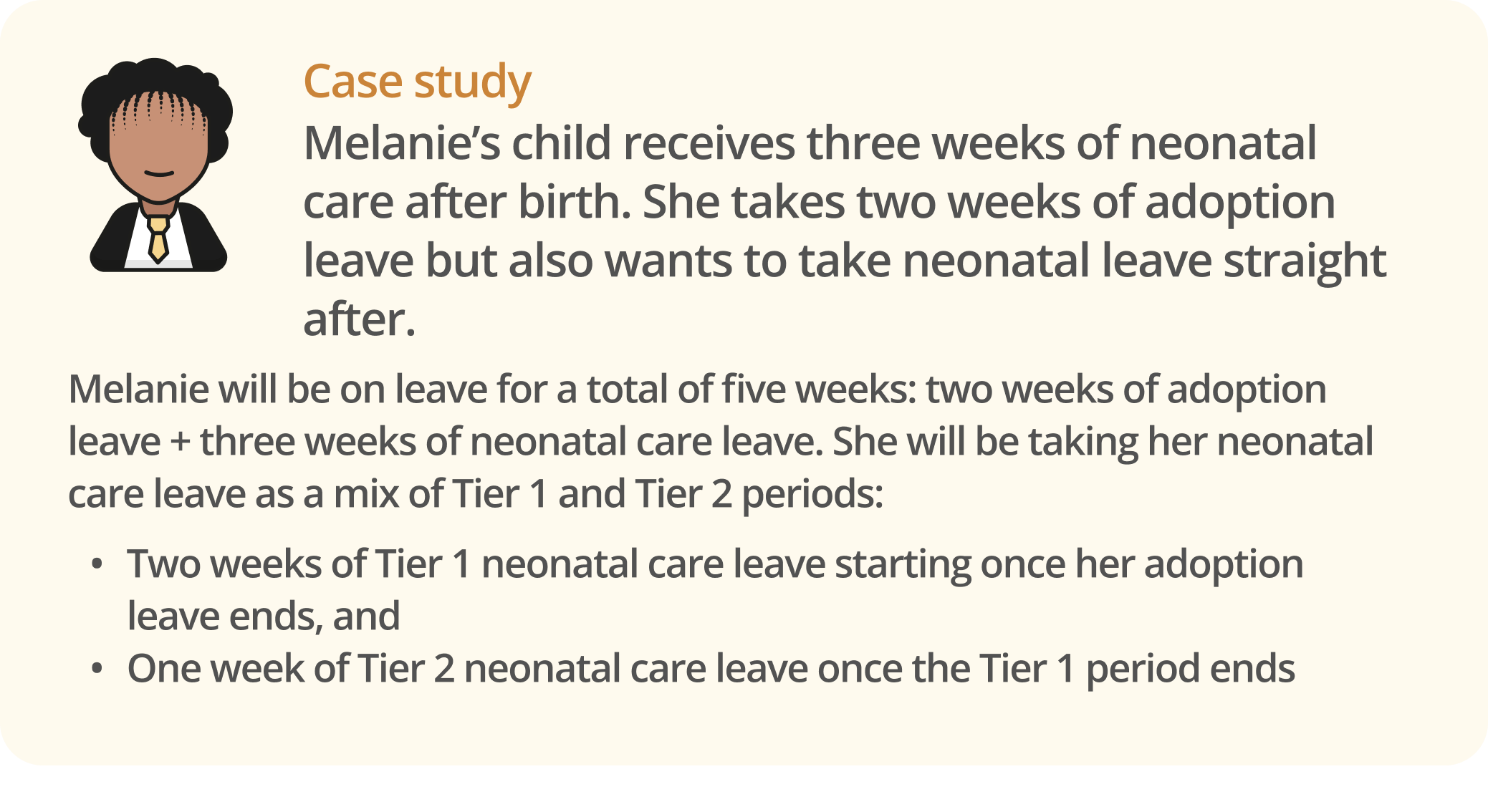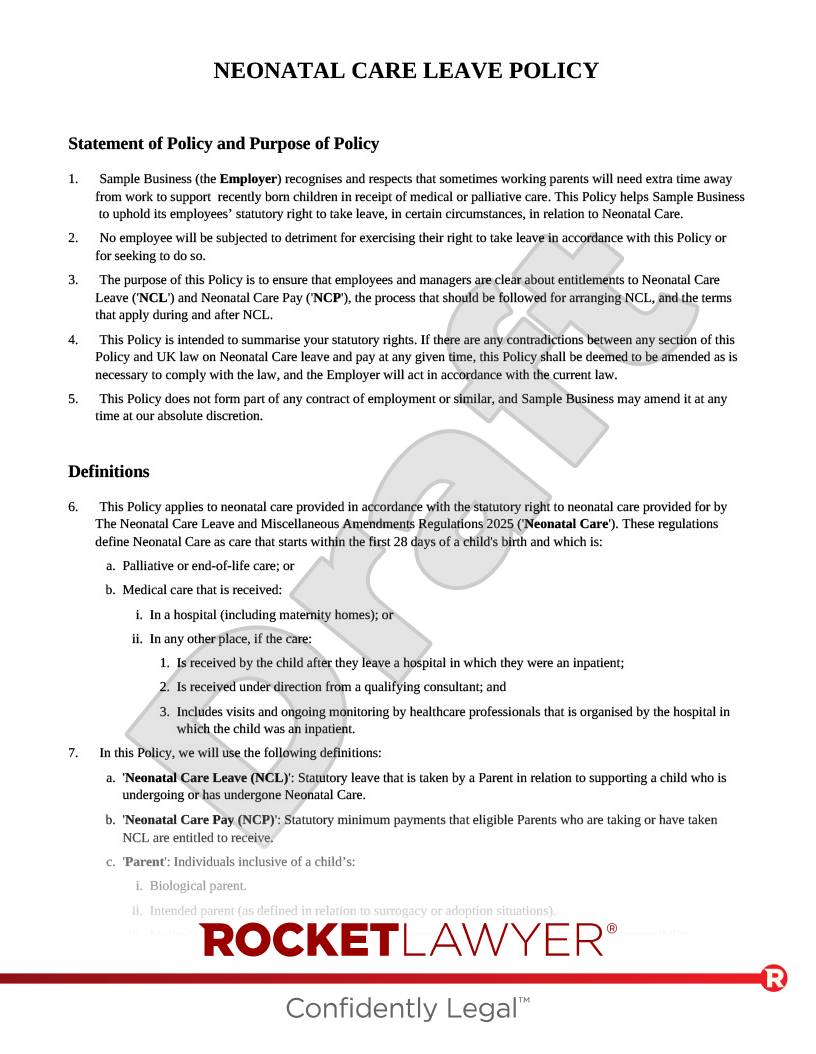What is neonatal care?
Under The Neonatal Care Leave and Miscellaneous Amendments Regulations 2025 (‘the Regulations’), neonatal care is where a child receives medical, palliative, or end-of-life care and treatment that starts within the first 28 days of birth. Qualifying medical care must be received by the child:
-
in a hospital or maternity home, or
-
anywhere else, so long as:
-
the child was an inpatient in hospital and continues to receive care after leaving
-
the care is provided as part of ongoing visits by healthcare professionals from that hospital, and
-
the care is provided under the direction of a medical consultant
-
Who is a consultant under the definition of neonatal care?
Under the Regulations, a consultant is defined as a medical practitioner who is:
-
an NHS consultant
-
a consultant on the Special Register held by the General Medical Council, or
-
neither of the above, but falls under one of the following:
-
a locum consultant for the NHS or private practice
-
a private practice medical consultant, or
-
a medical consultant in the armed forces
-
What counts as a hospital for neonatal care?
For the purposes of neonatal care, a hospital can be any institution or maternity home that treats people suffering from illness. This would include in clinics or outpatient departments connected with these institutions.
What is neonatal care leave?
Neonatal care leave is leave from work taken by a parent whose child is receiving (or has received) neonatal care in order to support and take care of that child.
A child must have received neonatal care for at least seven continuous days before their parent is entitled to statutory neonatal care leave. This seven-day continuous period is considered to start the day after the child’s care begins.
Employees are allowed to take one week of neonatal care leave for every week of neonatal care that their child receives, up to a maximum of 12 weeks. It must be taken by the end of 68 weeks after the child is born.
There are two categories of neonatal care leave depending on the status of the child’s care: Tier 1 and Tier 2 leave. These ‘tiers’ of neonatal care leave relate to how employees’ entitlement to neonatal care leave is handled by the employer depending on how closely it is taken after the child starts receiving neonatal care and impacts the notice requirements for taking leave or claiming pay.
The Tier 1 period begins the day that the child’s neonatal care starts and finishes at the end of the seventh day after the care has ended. So if an employee has accrued and intends to take one week of neonatal care leave in the Tier 1 period, they would need to take it whilst their child is actively receiving neonatal care or within a week of the care ending (ie the seven-day period after the care has ended). This means the shortest Tier 1 period would span two weeks: one week of qualifying neonatal care (remember that a child must be receiving care for at least seven consecutive days to qualify for neonatal care leave) and one week after the neonatal care has ended. If a child receives neonatal care for 11 weeks of available neonatal care leave, then an employee’s leave entitlement will fall within the Tier 1 period only.
Neonatal care leave will fall within the Tier 2 period if it begins any day after the Tier 1 period has finished up until the end of the 68 week period after the child is born. It is possible for employees to take Tier 1 neonatal leave intermittently with Tier 2 leave if, for example, their child starts receiving neonatal care again (ie after a first period of care ended) during the 68 week period after they are born.

Who is eligible for neonatal care leave?
Statutory neonatal care leave is only available to employees (ie somebody who works for an employer with the legal employment status of ‘employee’).
Employees will be eligible for neonatal care leave from day-one of employment (ie they need not have worked for the employer for any set amount of time) if:
-
their child is born on or after 6 April 2025
-
their child is has been receiving neonatal care for the qualifying seven-day period
-
they are considered to be the parent of that child, and
-
they fulfill the necessary notice requirements
An employee will be considered to be a parent of a child if they are:
-
a biological parent
-
an adoptive parent or surrogate parent who has a parental order (or intends to apply for one within six months of the child’s birth), or
-
the partner of the mother or adoptive or surrogate parent of the child and they’re expected to have a significant role in the child’s upbringing
What is neonatal care pay?
Neonatal care pay is the statutory minimum pay that eligible employees are entitled to in relation to a week of neonatal care leave. Employees who are entitled to neonatal care leave are not automatically entitled to neonatal care pay for that period – they must ensure they meet the eligibility requirements for statutory neonatal care pay.
Under the statutory entitlement, employers must pay eligible employees the lesser of either:
-
The set statutory rate of neonatal care pay as determined by the government year-on-year (currently £187.18 as of 6 April 2025), or
-
90% of the employee’s normal rate of pay
Who is eligible for neonatal care pay?
The eligibility criteria for neonatal care pay are slightly different to those for neonatal care leave.
Similar to neonatal care leave, statutory neonatal care pay is only available to employees.
An employee’s entitlement to neonatal care leave largely revolves around a specific employment date (ie the ‘Relevant Week’ or ‘Relevant Employment Week’). This employment date will depend on which alternative or other statutory entitlements an employee is entitled to receive. As such, the Relevant Employment Week for employees will be one of the following:
-
for employees entitled to maternity or paternity pay – 15 weeks before the expected week of childbirth
-
for employees who are entitled to statutory adoption pay – the week the employee is informed of the adoption match, or
-
in all other cases – a week before neonatal care begins
Employees will be eligible for neonatal care pay if they:
-
they are taking a week of qualifying neonatal care leave (ie care that’s within the definition of neonatal care set out above)
-
have at least 26 weeks of employment with the employer before the Relevant Employment Week
-
are entitled to remain employed by the same employer after the Relevant Employment Week
-
are earning no less than the lower earnings limit (a rate set annually by the government – it’s set at £125 per week as of 6 April 2025) for at least eight weeks before the Relevant Employment Week, and
-
fulfill the necessary notice requirements
Can employers provide enhanced neonatal care pay and leave?
An employer can choose to offer extended neonatal care leave (ie it can be extended past the statutory 12-week limit). Any extension will not be covered by statutory neonatal care pay, so this will be unpaid leave unless the employer opts to also pay the employee.
Employers can choose to offer enhanced neonatal care pay throughout employees’ neonatal care leave (eg by offering employees their normal rate of pay or a large percentage of it). This can show employees that the employer values their commitment and work, whilst also promoting employee retention through offering staff benefits. It can help to support employees during difficult times for their families. Employers can decide how much they will pay and how long for. Any enhanced entitlements should be clearly set out in a Neonatal care leave policy to ensure the rules are applied fairly and equally to all eligible employees.
Note that an employer is not required to provide any more than the statutory entitlement to leave or pay – it’s entirely your choice. You can also choose to set requirements that employees must meet to receive enhanced entitlements (eg a length of service with your business). However, it’s important not to limit employees’ statutory rights in any way. For example, if you impose additional eligibility requirements for enhanced neonatal care pay, make sure it’s clear that these don’t limit employees’ entitlement to statutory neonatal care pay.
If you have any questions or complex payment rules you would like to implement, you can Ask a lawyer your questions and use our bespoke drafting service to adapt your policy documents.
Complications when taking neonatal care leave
The entitlement for neonatal care leave can get confusing when the neonatal care leave clashes with contractual entitlements, alternative statutory entitlements, or even neonatal care for more than one child.
Statutory neonatal care leave and pay for multiple children
There are circumstances where employees will be the parent to more than one child receiving neonatal care over the same time period. Where this occurs, employees can take their neonatal care leave in relation to:
-
one child only, where the children receive neonatal care at the same time. It’s assumed that they will care for both children at the same time
-
each individual child (ie two separate sets of leave), where the children receive neonatal care on separate occasions (ie their care and treatment do not crossover)
Employees who are taking neonatal care leave for multiple children are still limited to a maximum entitlement of 12 weeks.
Contractual entitlements
Some employers may already provide for employee neonatal care leave and pay within employees’ Employment contracts, resulting in both a contractual right and a statutory right appearing to be available. Employees are not allowed to make use of both entitlements. However, they can choose whichever entitlement would be more beneficial to them – this will generally be the contractual right.
Other statutory leave and pay entitlements
Other statutory leave (eg maternity, paternity, adoption, unpaid parental, shared parental, or parental bereavement leave) that an employee has already booked off can clash with neonatal care leave. In these circumstances, the other statutory leave will take priority and the neonatal care leave will be considered to be ‘interrupted’.
Where the other statutory leave interrupts neonatal care leave in the Tier 1 period, employees will be able to take their accrued neonatal care leave:
-
immediately after the other statutory leave ends, so long as their other statutory leave ends within the Tier 1 period, or
-
together with any Tier 2 leave, if their other statutory leave ends within the Tier 2 period
Where the other statutory leave interrupts neonatal care leave in the Tier 2 period, employees will not be entitled to take neonatal care leave in their remaining Tier 2 period if they knew this would occur when providing notice for their neonatal care leave. It’s currently unclear whether this means that employees cannot take any neonatal care leave during the Tier 2 period or whether they cannot take the amount that would have accrued once the other statutory leave has ended. This should be clarified by either future regulations or case law.




